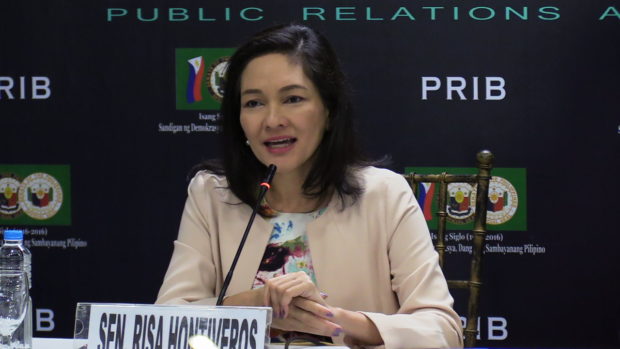Constitution, not martial law, should be tool in enforcing laws—Hontiveros

Sen. Risa Hontiveros. INQUIRER.net file photo / CATHY MIRANDA
MANILA, Philippines — Law enforcement agencies should rely on the 1987 Constitution on the fulfillment of their duties, and not on military rule, Senator Risa Hontiveros said on Wednesday.
Hontiveros, who is against the extension of martial law in Mindanao, was reacting to statements of Interior Secretary Eduardo Año during the joint session of the Congress.
“Mr. President, Mr. Speaker, sabi po ni Secretary Año that martial law has provided a good tool to our armed forces and national police to fulfill their mandates. Wala namang kasangkapan ang kailangan ng military at police kung hindi ang konstitusyon mismo,” Hontiveros noted.
“Nandito na po ang mga ordinaryo pero mas malalakas na kapangyarihan tulad nga po ng calling of powers ng Presidente,” she added.
Año claimed that aside from making law enforcement effective — as supposedly proven by the increasing number of local government units (LGUs) awarded with the Seal of Good Local Governance (SGLG) — people in Mindanao actually approve of martial law.
Article continues after this advertisement“Based on what’s happening in Mindanao, the implementation of martial law has provided a good tool for the military and the Philippine National Police (PNP) in fulfilling its mandate. We see that during the implementation of martial law, our chief executives are more cooperative, supportive in our campaign against rebel groups,” the former military chief said.
Article continues after this advertisement“In fact, the feedback from the people are very positive, because now they can go around without subjected to violence from these lawless elements […] There were instance when checkpoints are put out, the people objected, they wanted to restore back the checkpoints,” he added.
Still, Hontiveros expressed fears that the military rule may be used in harassing local and national politicians from the opposition, especially those who will run in the 2019 midterm elections.
“Under a government with a dismal human rights record, martial law could be used to harass the political opposition and the electoral opponents of the President and his allies,” the opposition senator noted.
“This could take the form of restraining their activities, branding them terrorists and subversives and even putting them behind bars. This has historical precedent,” she added.
She also mentioned that with the writ of habeas corpus suspended, candidates who are critical of the administration may be held, thus being unable to campaign and increase their chances of landing local seats.
“I can very well see a situation in which a case of rebellion will be filed against a political opponent, he or she will be arrested and detained, and with the writ of habeas corpus still suspended, he or she will not be able to campaign or participate in the electoral exercise,” Hontiveros explained.
“This is not far-fetched. The Duterte administration has a record of distorting the rule of law and mobilizing the state’s resources and machinery against its perceived opponents,” she added.
The Congress is currently conducting a joint session to tackle the extension of martial law in Mindanao, as requested by President Rodrigo Duterte. According to the administration officials, there is a continuing rebellion in Mindanao, necessitating the need for additional power to law enforcement agencies. /jpv
READ: Duterte formally asks Senate, House to extend martial law in Mindanao